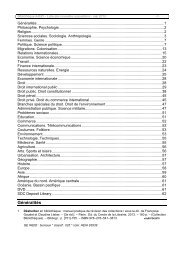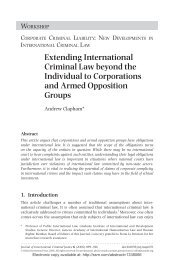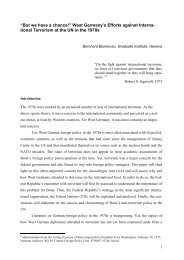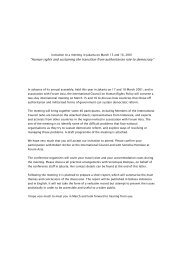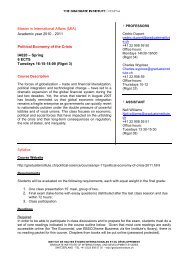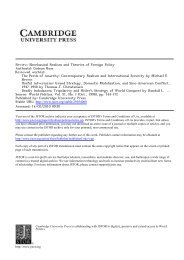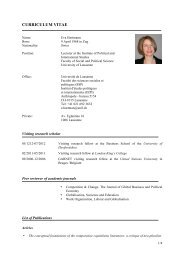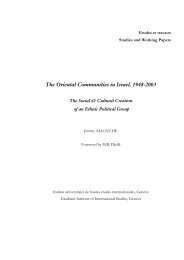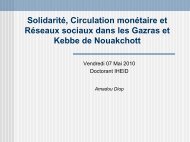The 1953 Coup D'etat in Iran Author(s): Mark J. Gasiorowski Source ...
The 1953 Coup D'etat in Iran Author(s): Mark J. Gasiorowski Source ...
The 1953 Coup D'etat in Iran Author(s): Mark J. Gasiorowski Source ...
Create successful ePaper yourself
Turn your PDF publications into a flip-book with our unique Google optimized e-Paper software.
<strong>The</strong> <strong>1953</strong> <strong>Coup</strong> D'Etat <strong>in</strong> <strong>Iran</strong> 275<br />
Mosaddeq's house were destroyed with tank and artillery fire. <strong>The</strong> house was<br />
stormed, and Mosaddeq escaped over the roof. He surrendered to Zahedi the<br />
next day.<br />
AN APPRAISAL OF THE U.S. ROLE IN THE COUP<br />
<strong>The</strong> three questions posed <strong>in</strong> the <strong>in</strong>troduction to this study can now be answered.<br />
What motives led U.S. policymakers to overthrow Mosaddeq? It is often<br />
argued that the ma<strong>in</strong> motive beh<strong>in</strong>d the coup was the desire of U.S. policymakers<br />
to help U.S. oil companies ga<strong>in</strong> a share <strong>in</strong> <strong>Iran</strong>ian oil production.68 On the face<br />
of it, this argument has considerable merit. <strong>The</strong> Eisenhower adm<strong>in</strong>istration was<br />
certa<strong>in</strong>ly favorable to U.S. bus<strong>in</strong>ess <strong>in</strong>terests, and the Dulles brothers' law firm<br />
had often represented U.S. oil companies <strong>in</strong> legal matters. Moreover, the f<strong>in</strong>al<br />
agreement worked out <strong>in</strong> 1954 with the Zahedi government gave U.S. companies<br />
a 40% share <strong>in</strong> <strong>Iran</strong>ian oil production, which had previously been controlled by<br />
the British.<br />
While this view cannot entirely be refuted, it seems more plausible to argue<br />
that U.S. policymakers were motivated ma<strong>in</strong>ly by fears of a communist takeover<br />
<strong>in</strong> <strong>Iran</strong>, and that the <strong>in</strong>volvement of U.S. companies was sought ma<strong>in</strong>ly to<br />
prevent this from occurr<strong>in</strong>g. <strong>The</strong> Cold War was at its height <strong>in</strong> the early 1950s,<br />
and the Soviet Union was viewed as an expansionist power seek<strong>in</strong>g world<br />
dom<strong>in</strong>ation. Eisenhower had made the Soviet threat a key issue <strong>in</strong> the 1952<br />
elections, accus<strong>in</strong>g the Democrats of be<strong>in</strong>g soft on communism and of hav<strong>in</strong>g<br />
"lost Ch<strong>in</strong>a." Once <strong>in</strong> power, the new adm<strong>in</strong>istration quickly sought to put its<br />
views <strong>in</strong>to practice: the State Department was purged of homosexuals and<br />
suspected communists, steps were taken to strengthen the Western alliance, and<br />
<strong>in</strong>itiatives were begun to bolster the Western position <strong>in</strong> Lat<strong>in</strong> America, the<br />
Middle East, and East Asia. Viewed <strong>in</strong> this context, and com<strong>in</strong>g as it did only<br />
two weeks after Eisenhower's <strong>in</strong>auguration, the decision to overthrow Mosaddeq<br />
appears merely as one more step <strong>in</strong> the global effort of the Eisenhower adm<strong>in</strong>is-<br />
tration to block Soviet expansionism.69<br />
Moreover, the major U.S. oil companies were not <strong>in</strong>terested <strong>in</strong> <strong>Iran</strong> at this<br />
time. A glut existed <strong>in</strong> the world oil market. <strong>The</strong> U.S. majors had <strong>in</strong>creased their<br />
production <strong>in</strong> Saudi Arabia and Kuwait <strong>in</strong> 1951 <strong>in</strong> order to make up for the loss<br />
of <strong>Iran</strong>ian production; operat<strong>in</strong>g <strong>in</strong> <strong>Iran</strong> would force them to cut back production<br />
<strong>in</strong> these countries which would create tensions with Saudi and Kuwaiti leaders.<br />
Furthermore, if nationalist sentiments rema<strong>in</strong>ed high <strong>in</strong> <strong>Iran</strong>, production there<br />
would be risky. U.S. oil companies had shown no <strong>in</strong>terest <strong>in</strong> <strong>Iran</strong> <strong>in</strong> 1951 and<br />
1952. By late 1952, the Truman adm<strong>in</strong>istration had come to believe that partici-<br />
pation by U.S. companies <strong>in</strong> the production of <strong>Iran</strong>ian oil was essential to<br />
ma<strong>in</strong>ta<strong>in</strong> stability <strong>in</strong> <strong>Iran</strong> and keep <strong>Iran</strong> out of Soviet hands. In order to ga<strong>in</strong> the<br />
participation of the major U.S. oil companies, Truman offered to scale back a<br />
large anti-trust case then be<strong>in</strong>g brought aga<strong>in</strong>st them. <strong>The</strong> Eisenhower adm<strong>in</strong>istra-<br />
tion shared Truman's views on the participation of U.S. companies <strong>in</strong> <strong>Iran</strong> and<br />
also agreed to scale back the anti-trust case. Thus, not only did U.S. majors not



![Download [pdf] - The Graduate Institute, Geneva](https://img.yumpu.com/23370020/1/190x248/download-pdf-the-graduate-institute-geneva.jpg?quality=85)
